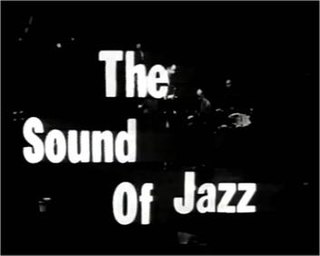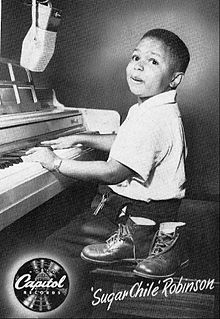
Billie Holiday was an American jazz and swing music singer. Nicknamed "Lady Day" by her friend and music partner, Lester Young, Holiday had an innovative influence on jazz music and pop singing. Her vocal style, strongly inspired by jazz instrumentalists, pioneered a new way of manipulating phrasing and tempo. She was known for her vocal delivery and improvisational skills.

William James "Count" Basie was an American jazz pianist, organist, bandleader, and composer. In 1935, he formed the Count Basie Orchestra, and in 1936 took them to Chicago for a long engagement and their first recording. He led the group for almost 50 years, creating innovations like the use of two "split" tenor saxophones, emphasizing the rhythm section, riffing with a big band, using arrangers to broaden their sound, and others. Many musicians came to prominence under his direction, including the tenor saxophonists Lester Young and Herschel Evans, the guitarist Freddie Green, trumpeters Buck Clayton and Harry "Sweets" Edison, plunger trombonist Al Grey, and singers Jimmy Rushing, Helen Humes, Thelma Carpenter, and Joe Williams.
Paul Quinichette was an American jazz tenor saxophonist. He was known as the "Vice President" or "Vice Prez" for his emulation of the breathy style of Lester Young, whose nickname was "The President", or simply "Prez". Young called Quinichette "Lady Q".

Charles James Shavers was an American jazz trumpeter who played with Dizzy Gillespie, Nat King Cole, Roy Eldridge, Johnny Dodds, Jimmie Noone, Sidney Bechet, Midge Williams, Tommy Dorsey, and Billie Holiday. He was also an arranger and composer, and one of his compositions, "Undecided", is a jazz standard.

"The Sound of Jazz" is a 1957 edition of the CBS television series The Seven Lively Arts and was one of the first major programs featuring jazz to air on American network television.

Lester Willis Young, nicknamed "Pres" or "Prez", was an American jazz tenor saxophonist and occasional clarinetist.
"April in Paris" is a popular song composed by Vernon Duke with lyrics by Yip Harburg in 1932 for the Broadway musical Walk a Little Faster. The original 1933 hit was performed by Freddy Martin, and the 1952 remake was by the Sauter-Finegan Orchestra, whose version made the Cashbox Top 50. Composer Alec Wilder writes, "There are no two ways about it: this is a perfect theater song. If that sounds too reverent, then I'll reduce the praise to 'perfectly wonderful,' or else say that if it's not perfect, show me why it isn't."
From Spirituals to Swing was the title of two concerts presented by John Hammond in Carnegie Hall on 23 December 1938 and 24 December 1939. The concerts included performances by Count Basie, Benny Goodman, Big Joe Turner and Pete Johnson, Helen Humes, Meade Lux Lewis, Albert Ammons, Mitchell's Christian Singers, the Golden Gate Quartet, James P. Johnson, Big Bill Broonzy and Sonny Terry.
Emmett Berry was an American jazz trumpeter.

Benny Morton was an American jazz trombonist, most associated with the swing genre.
Preston Haynes Love was an American saxophonist, bandleader, and songwriter from Omaha, Nebraska, United States, best known as a sideman for jazz and rhythm and blues artists like Count Basie and Ray Charles.

Frank Isaac Robinson, known in his early musical career as Sugar Chile Robinson, is an American jazz pianist and singer. A Detroit native, Robinson became famous as a child prodigy in the mid–1940s.

Lady Day: The Complete Billie Holiday on Columbia 1933–1944 is a 10-CD box set compiling the complete known studio master recordings, plus alternate takes, of Billie Holiday during the time period indicated, released in 2001 on Columbia/Legacy, CXK 85470. Designed like an album of 78s, the medium in which these recordings initially appeared, the 10.5" × 12" box includes 230 tracks, a 116-page booklet with extensive photos, a song list, discography, essays by Michael Brooks, Gary Giddins, and Farah Jasmine Griffin, and an insert of appreciations for Holiday from a diversity of figures including Tony Bennett, Elvis Costello, Marianne Faithfull, B.B. King, Abbey Lincoln, Jill Scott, and Lucinda Williams. At the 44th Grammy Awards on February 27, 2002, the box set won the Grammy Award for Best Historical Album of the previous year.
"Jumpin' at the Woodside" is a song first recorded in 1938 by the Count Basie Orchestra, and considered one of the band's signature tunes. When first released it reached number 11 on the Billboard charts and remained on them for four weeks. Since then, it has become a frequently recorded jazz standard.
"Sugar", also known as "That Sugar Baby o' Mine", is a popular song by Maceo Pinkard, his wife Edna Alexander and Sidney D. Mitchell. Recorded by Ethel Waters on February 20, 1926, it soon achieved chart success.
Columbia Jazz Masterpieces was a series of Jazz CD, LP and cassette reissues from Columbia Records which began in 1986. Written inside the blue box used on all the album covers "Digitally Remastered Directly from the Original Analog Tapes." In Europe, the series was known as CBS Jazz Masterpieces, with the reissues being released by CBS Records, until 1991, when the Columbia Jazz Masterpieces title was used on all subsequent releases and represses.
Jimmy Lewis was an American double bassist who worked with the Count Basie Orchestra and sextet in the 1950s and with Duke Ellington, Cootie Williams, Billie Holiday and Ivory Joe Hunter before moving to bass guitar during his time with King Curtis. He provided the basslines for the musical Hair. Lewis freelanced extensively and performed on many albums by soul and jazz musicians, including Horace Silver and the Modern Jazz Quartet up until the late 1980s. He died in 2000.

Boogie Woogie is a compilation album containing four 10-inch, 78 rpm records of boogie-woogie music. The songs on the album were recorded over a period of three years from 1936 to 1939, then released in 1941 on this compilation album by Columbia Records (C44). Artists featured on the album include Harry James, Count Basie, Big Joe Turner, and the three prominent boogie-woogie pianists of the time, Albert Ammons, Pete Johnson, and Meade Lux Lewis.
"This Year's Kisses" is a popular song written in 1936 by Irving Berlin for the musical film On the Avenue (1937) and introduced by Alice Faye. Popular recordings in 1937 were by Benny Goodman, Hal Kemp, Shep Fields and by Teddy Wilson with Billie Holiday.
For other people with similar names see William Cowan









